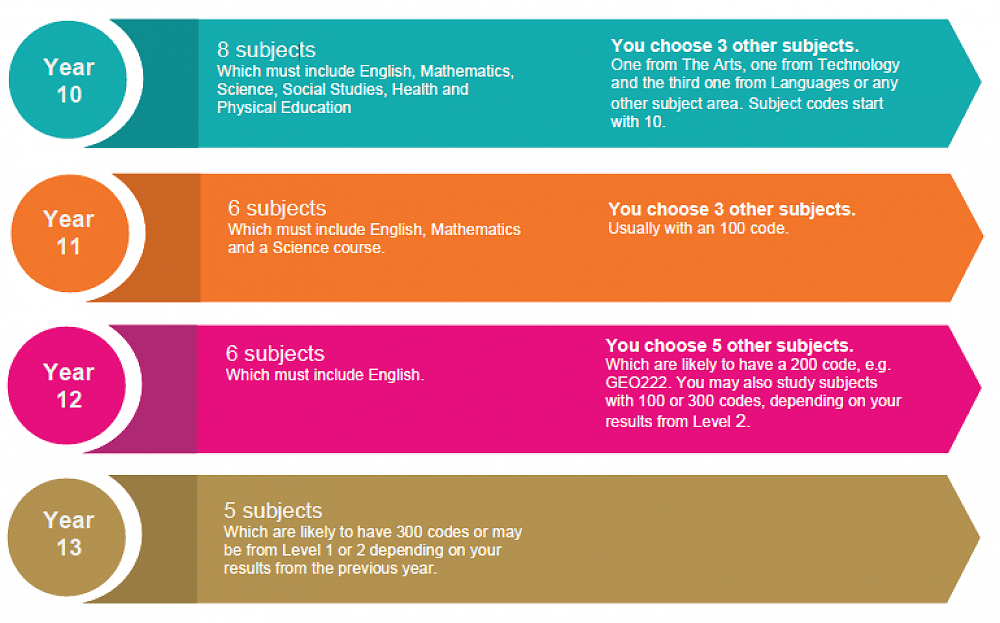
Welcome to Subject Choice for 2021
Subject choice is an important process in your school year. You need to consider a number of factors when choosing your subjects for next year. Think carefully about your learning and talk with as many people as you can about the variety of subjects available to you.
CHOOSING A COURSE
Choose subjects or a course that:
- You are good at.
- Will allow you to get the qualifications you need.
- Will lead you to the career you have in mind.
- You enjoy and are likely to do well in.
- Provides a pathway supporting future plans.
- Will be broad enough to allow flexibility if you change your mind in the future.
HOW MANY SUBJECTS DO I STUDY?

QUALIFICATIONS
All learning leads towards gaining a National Certificate of Educational Achievement (NCEA). Subjects in Year 9 and 10 build the foundations for learning in Year 11 and success in gaining qualifications. All subjects at Level 1, 2 and 3 in the senior school are assessed against achievement or unit standards which are worth credits.

All NCEA certificates may be endorsed with Merit or with Excellence. You need at least 50 credits at Merit or at Excellence at the same level to earn endorsed certificates.
Course or subject endorsement is also possible if you achieve 14 credits or more at Merit or Excellence.
UNIVERSITY ENTRANCE (UE) REQUIREMENTS
- NCEA Level 3 Certificate
- 14 credits in each of the 3 subjects from the list of approved subjects
- UE numeracy - 10 numeracy credits at level 1 or higher
- UE literacy - 10 literacy credits at level 2 (5 reading, 5 writing). These can be gained from specific standards in a number of different subjects.
ACADEMIC PROGRESSION
It is recommended that you need to achieve a complete NCEA certificate at each level in order to take a full programme at the next level.
- Year 12 students who have not achieved NCEA Level 1 may take a mixture of 200 and 100 level subjects.
- Year 13 students who have not achieved NCEA Level 2 should not take 5 subjects at 300 level and could do a multi-level programme of learning.
You must check the entry requirements for each subject you want to take and ensure you achieve enough credits to continue it in the following year. Generally, you need to have achieved at least 10 credits in a subject to be allowed to study it at the next level. Some subjects do not have entry requirements. This means that you may choose
these subjects without having studied them before. If you have any queries or concerns about entry to a subject you should discuss this with the contact person listed.
CAREER EDUCATION
Career Education aims at developing career competencies appropriate for each level. These include self- awareness, exploring opportunities, deciding and acting, skills for job search and the world of work.
- All students & parents have access to the Career Development web site Career Central.
- All students participate in a range of Career Development activities during their Ako time using Career Central.
- Students in Year 11-12 have an individual interview.
- Year 13 students have an individual interview to assist them in planning their future. There is also a range of career presentations and seminars
CAREER DEVELOPMENT OPPORTUNITIES
All students are able to make an appointment for a career interview at any time.
- The department aims to "touch base" with each girl every year to assist her pathway planning.
- All students have access to career resources.
- A staff member is available each lunchtime to help st udents.
- Any girl in the senior school may request a work experience of up to 5 days.
- A range of needs-based STAR courses are available to provide hands on experience and assist with career decision making.
- The Gateway Programme is available to Year 12 and 13 students. This assists students to gain vocational credits while undertaking extended work experience in a career that they are considering pursuing.
- There is an opportunity for Year 12 and 13 students to dual enroll to study 1 or 2 days per week at a Trades Academy.
- A job search programme is available to Year 12 and 13 students who are in transition from school.
- Lunchtime talks on a range of careers and tertiary education opportunities are held throughout the year.
For further information about Career Education or support, please email Ms Guinness at nguinness@avonside.school.nz
VOCATIONAL PATHWAYS
Achieving success in a Vocational Pathway means that as a student you have developed skills and knowledge in areas that employers value and are relevant to their industries.
If you are aiming for a career in a particular sector, the Vocational Pathways tools can help you to see which subjects and standards you should do to get to where you want to go. If you are undecided on a career, the pathways can help you see how your strengths and interests match up to an amazing range of jobs and study options available.
To get started visit: The 'Profile builder' http://youthguarantee.net.nz which provides information about jobs and study options. The 'Occupation Outlook' shows where the real job opportunities exist.
Below are the different vocational pathways. Thoughout the booklet, each Learning Area will outline which VP they cater to within their subjects.

AVONSIDE GIRLS' HIGH SCHOOL CURRICULUM 2021


